

As per INDIAN STANDARD TIME
| Date | Match | Time | Venue |
|---|---|---|---|
| 14th June | Russia vs Saudi Arabia | 8:30 PM | Luzhniki Stadium, Moscow. |
| 15th June | Egypt vs Uruguay | 5:30 PM | Central Stadium, Yekaterinburg. |
| 15th June | Morocco vs Iran | 8:30 PM | Krestovsky Stadium, Saint Petersburg. |
| 15th June | Portugal vs Spain | 11:30 PM | Fisht Olympic Stadium, Sochi. |
| 16th June | France vs Australia | 3:30 PM | Kazan Arena, Kazan. |
| 16th June | Peru vs Denmark | 9:30 PM | Mordovia Arena, Saransk. |
| 16th June | Argentia vs Iceland | 6:30 PM | Otkrytiye Arena, Moscow. |
| 16th June | Croatia vs Nigeria | 11:30 PM | Kaliningrad Stadium, Kaliningrad. |
| 17th June | Costa Rica vs Serbia | 5:30 PM | Cosmos Arena, Samara. |
| 17th June | Brazil vs Switzerland | 11:30 PM | Rostov Arena, Rostov-on-Don. |
| 17th June | Germany vs Mexico | 8:30 PM | Luzhniki Stadium, Moscow. |
| 18th June | Sweden vs South Korea | 5:30 PM | Nizhny Novgorod Stadium. |
| 18th June | Belgium vs Panama | 8:30 PM | Fisht Olympic Stadium, Sochi. |
| 18th June | Tunisia vs England | 11:30 PM | Volgograd Arena, Volgograd. |
| 19th June | Poland vs Senegal | 5:30 PM | Otkrytiye Arena, Moscow. |
| 19th June | Colombia vs Japan | 8:30 PM | Mordovia Arena, Saransk. |
| 19th June | Russia vs Egypt | 11:30 PM | Krestovsky Stadium, Saint Petersburg. |
| 20th June | Uruguay vs Saudi Arabia | 8:30 PM | Rostov Arena, Rostov-on-Don. |
| 20th June | Portugal vs Morocco | 5:30 PM | Luzhniki Stadium, Moscow. |
| 20th June | Iran vs Spain | 11:30 PM | Kazan Arena, Kazan. |
| 21th June | France vs Peru | 5:30 PM | Central Stadium, Yekaterinburg. |
| 21th June | Denmark vs Australia | 8:30 PM | Cosmos Arena, Samara. |
| 21th June | Argentia vs Croatia | 11:30 PM | Nizhny Novgorod Stadium. |
| 22th June | Nigeria vs Iceland | 8:30 PM | Volgograd Arena, Volgograd. |
| 22th June | Brazil vs Costa Rica | 5:30 PM | Krestovsky Stadium, Saint Petersburg. |
| 22th June | Serbia vs Switzerland | 11:30 PM | Kaliningrad Stadium, Kaliningrad. |
| 23th June | Germany vs Sweden | 8:30 PM | Fisht Olympic Stadium, Sochi. |
| 23th June | South Korea vs Mexico | 11:30 PM | Rostov Arena, Rostov-on-Don. |
| 23th June | Belgium vs Tunisia | 5:30 PM | Otkrytiye Arena, Moscow. |
| 24th June | England vs Panama | 11:30 PM | Nizhny Novgorod Stadium. |
| 24th June | Japan vs Senegal | 8:30 PM | Central Stadium, Yekaterinburg. |
| 24th June | Poland vs Colombia | 11:30 PM | Kazan Arena, Kazan. |
| 25th June | Uruguay vs Russia | 7:30 PM | Cosmos Arena, Samara. |
| 25th June | Saudi Arabia vs Egypt | 7:30 PM | Volgograd Arena, Volgograd. |
| 25th June | Iran vs Portugal | 11:30 PM | Mordovia Arena, Saransk. |
| 25th June | Spain vs Morocco | 11:30 PM | Kaliningrad Stadium, Kaliningrad. |
| 26th June | Denmark vs France | 7:30 PM | Luzhniki Stadium, Moscow. |
| 26th June | Australia vs Peru | 7:30 PM | Fisht Olympic Stadium, Sochi. |
| 26th June | Nigeria vs Argentina | 11:30 PM | Krestovsky Stadium, Saint Petersburg. |
| 26th June | Iceland vs Croatia | 11:30 PM | Rostov Arena, Rostov-on-Don. |
| 27th June | Serbia vs Brazil | 11:30 PM | Otkrytiye Arena, Moscow. |
| 27th June | Switzerland vs Costa Rica | 11:30 PM | Nizhny Novgorod Stadium. |
| 27th June | South Korea vs Germany | 7:30 PM | Kazan Arena, Kazan. |
| 27th June | Mexico vs Sweden | 7:30 PM | Central Stadium, Yekaterinburg. |
| 28th June | England vs Belgium | 11:30 PM | Kaliningrad Stadium, Kaliningrad. |
| 28th June | Panama vs Tunisia | 11:30 PM | Mordovia Arena, Saransk. |
| 28th June | Japan vs Poland | 7:30 PM | Volgograd Arena, Volgograd. |
| 28th June | Senegal vs Colombia | 7:30 PM | Cosmos Arena, Samara. |
FIFA World Cup Schedule Indian Time – Knockout
| Knockout Round of 16 | ||||
|---|---|---|---|---|
| Date | Match | Time | Venue | |
| 30th June | Winner Group A vs Runner-up Group B | 7:30 PM | Kazan Arena, Kazan. | |
| 30th June | Winner Group C vs Runner-up Group D | 11:30 PM | Fisht Olympic Stadium, Sochi. | |
| 1st July | Winner Group B vs Runner-up Group A | 7:30 PM | Luzhniki Stadium, Moscow. | |
| 1st July | Winner Group D vs Runner-up Group C | 11:30 PM | Nizhny Novgorod Stadium. | |
| 2nd July | Winner Group E vs Runner-up Group F | 7:30 PM | Cosmos Arena, Samara. | |
| 2nd July | Winner Group G vs Runner-up Group H | 11:30 PM | Rostov Arena, Rostov-on-Don. | |
| 3rd July | Winner Group F vs Runner-up Group E | 7:30 PM | Krestovsky Stadium. | |
| 3rd July | Winner Group H vs Runner-up Group G | 11:30 PM | Otkrytiye Arena, Moscow. | |
FIFA World Cup Fixture Indian Time – Quarter Finals
| Quarter-Finals | ||||
|---|---|---|---|---|
| Date | Match | Time | Venue | |
| 6th July | Winner Match 49 vs Winner Match 50 | 7:30 PM | Nizhny Novgorod Stadium. | |
| 6th July | Winner Match 53 vs Winner Match 54 | 11:30 PM | Kazan Arena, Kazan. | |
| 7th July | Winner Match 55 vs Winner Match 56 | 7:30 PM | Cosmos Arena, Samara. | |
| 7th July | Winner Match 51 vs Winner Match 52 | 11:30 PM | Fisht Olympic Stadium, Sochi. | |
2018 FIFA World Cup Schedule IST – Semi-Finals
| Semi-Finals | ||||
|---|---|---|---|---|
| Date | Match | Time | Venue | |
| 10th July | Winner Match 57 vs Winner Match 58 | 11:30 PM | Krestovsky Stadium, Saint Petersburg. | |
| 11th July | Winner Match 59 vs Winner Match 60 | 11:30 PM | Luzhniki Stadium, Moscow. | |
2018 FIFA World Cup Fixture ist – Play-Off
| Third Play Match | ||||
|---|---|---|---|---|
| Date | Match | Time | Venue | |
| 14th July | Loser Match 61 vs Loser Match 62 | 7:30 PM | Krestovsky Stadium, Saint Petersburg. | |
FIFA World Cup 2018 Schedule Indian Standard Time – Final Match
| Final Match | ||||
|---|---|---|---|---|
| Date | Match | Time | Venue | |
| 15th July | Winner Match 61 vs Winner Match 62 | 8:30 PM | Luzhniki Stadium, Moscow. | |
SOME INFO ABOUT THE TEAMS :-
GROUP A
URUGUAY
World Cup appearances: 13
Best finish: Champions (2X) in 1930 and 1950
Last World Cup: 2014, round of 16
Best Player 
It’s Luis Suarez, though it’s close with Edinson Cavani. Suarez has been the gold standard of a true No. 9 striker over the last several years, scoring at least 30 goals for his clubs in six of the last seven seasons. But Cavani has been equally great. He’s scored at least 40 goals in each of the last two seasons and is coming off a much better season than Suarez. He does plenty of sacrificing for the national team but playing a bit below the top line, helping out defensively. Needless to say, having Suarez and Cavani up top is a luxury most countries would dream of.
Player to watch

Matias Vecino. The 26-year-old midfielder has really impressed at Inter Milan after some fine seasons at Fiorentina. He’s a talented guy who has been a key part to Tabarez’s new generation of midfielders taking over the national team. He helps a midfield that is balanced and creative, good on the ball but also not afraid to get physical to recover the ball. Uruguay’s central defensive pairing and strikers are as good as any other national team, and if they get the midfield to gel, watch out. If it does, Vecino will be a big reason why.
RUSSIA
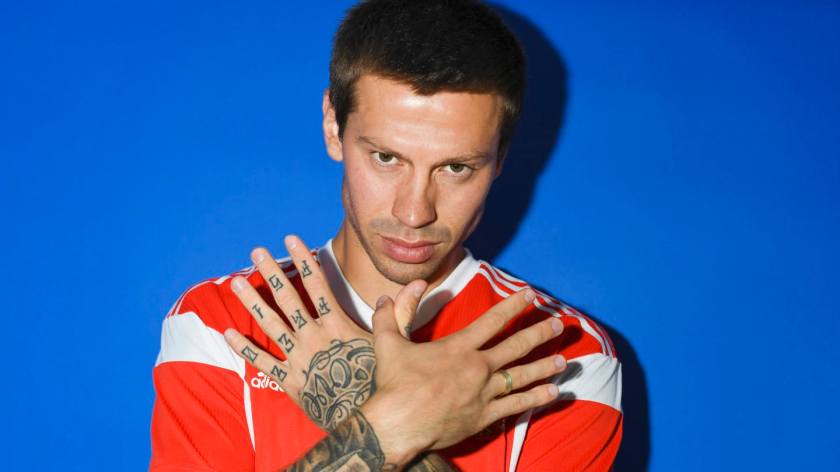
Fyodor Smolov, striker, 28
Smolov was in the running to pick up his third consecutive Russian top-scorer award right until the end of last season, before eventually losing out to Dutch forward Quincy Promes by a solitary strike. The Sbornaya have recently found goals hard to come by, so Smolov is their main hope in this respect. During Cherchesov’s time at the helm, Smolov has scored seven goals, including a brace against Spain. He is intent on adding to that tally at the World Cup, where he is likely to be deployed as a lone striker.

Aleksandr Samedov, right winger, 33
Talking to Samedov, you are left in no doubt as to how fired up he is for Russia 2018. He recently declared, without a hint of hyperbole, that “it’s the biggest tournament of my life.” Although not guaranteed a starting spot at club level, his role for the national team cannot be overestimated. Over the last few years, his output in terms of goals and assists combined has been higher than anyone else in the squad. The player made his Sbornaya debut in 2011, played at the World Cup during Brazil 2014, but has only recently established himself as a first-team regular. He has that rare ability to arrive in the right place at the right time, a quality that could help the team meet the expectations of millions of fans this summer.
GROUP B
PORTUGAL

Following a 10-year stint with the Los Blancos, Pepe sought another challenge in the twilight end of his career as he moved to Turkish giants Besiktas in the 2017 summer transfer window.
The 35-year old cannot be taken for granted as he boasts of a career many could only imagine which saw him win multiple Champions Leagues and domestic league titles with Real Madrid.
The Portuguese will look to their one constant commander-in-chief at the back to recreate his performances at the Euros 2016 where he won man-of-the-match in the finals against hosts France as they won 1-0 in extra time.
Playing in his last world cup, Pepe will be as hungry as ever to end his career on a high with a fantastic showing for his nation and will have to guide the younger players in the team who will look up to him for inspiration when times get tough.
Known for his rash challenges and mature defensive displays, the centre-back will be prepared to do anything for the team as they require from him.
Portugal has drawn Spain in their group in the final 32 and Pepe will have to be alert to the Spanish attack if his team are to move to the ending stages of the tournament.
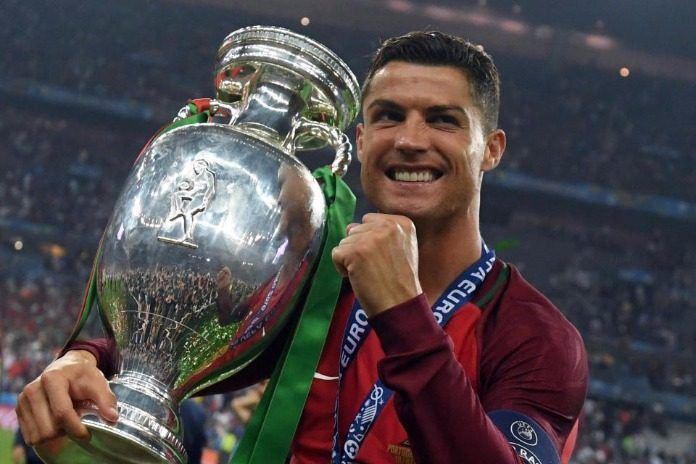
Position: Forward
Portugal’s best ever player without doubt and arguably the best footballer our generation has ever witnessed, Ronaldo will be looking to add the one winner’s medal that has eluded him in his glorious footballing career, the World Cup.
The five-time Champions League winner knows what it takes to perform on the big stage where he has consistently scored important yet stunning goals for Real Madrid; be it over-head kicks, long-range goals or vital last-minute penalties.
In 65 appearances for Portugal at International qualifiers where it all matters, he has scored an astonishing 50 goals. The 33-year-old and five-time Ballon d’Or winner will be looking to add more goals to his international tally before he retires.
A good run at the World Cup for his team will ensure he grabs a record sixth Ballon d’Or trophy and marks his name as the best footballer in World football.
All eyes will be on Ronaldo and his team as he leads dark horses Portugal to the latter stages of the tournament and competes with the likes of rivals Messi, Neymar and Salah for top spots at the World Cup 2018.

Ricardo Andrade Quaresma Bernardo (European Portuguese: [ʁiˈkaɾðu kwɐˈɾɛʒmɐ]; born 26 September 1983) is a Portuguese professional footballer who plays as a winger for Turkish club Beşiktaş and the Portugal national team.
Quaresma began his career at Sporting CP, and has also played for Barcelona, Inter Milan, Chelsea, Beşiktaş and Al-Ahli Dubai, however he spent the best years of his career at Porto. He is popular for incorporating a repertoire of tricks into his style of play, including the rabona and trivela. A winger who can play on either flank, his qualities of speed and finesse cause a regular problem for opposing defenses.[2]
A full international since 2003, Quaresma has over 75 caps for Portugal and represented them at three European Championships, including his nation’s victorious campaign at UEFA Euro 2016, also reaching the semi-finals at Euro 2012.
SPAIN

Ask any Manchester United fan who their most important player is and the reply will unanimously be De Gea. The goalkeeper has been United’s best player for several seasons now, with his ability to make extraordinary saves a sight to behold.
That ability will come in handy for Spain at this World Cup and this really could be the tournament when De Gea turns from a superstar club player to one at the international level as well.

As good as Cristiano Ronaldo is, Real Madrid would not have won all of those Champions League titles if not for Ramos, their ultimate big-game player. He needs to be that same man for Spain in this World Cup.
Thiago Alcantara:
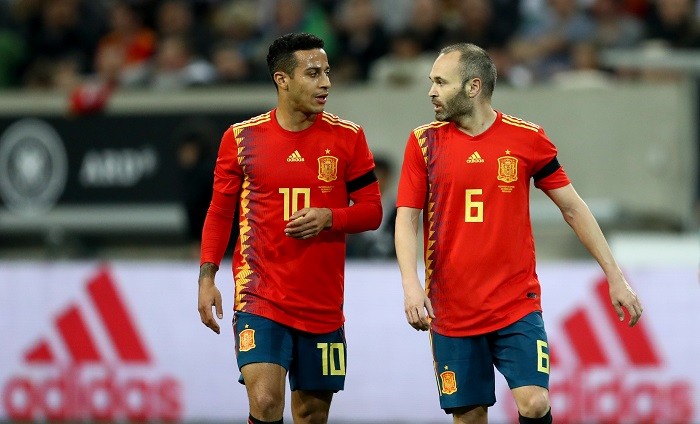
In the shadows of Xavi and Andres Iniesta for quite a while, this could be the tournament that Thiago makes his own. Has the ability to see passes not many can and has the ability to dictate the pace of the game according to his wishes.
Diego Costa:
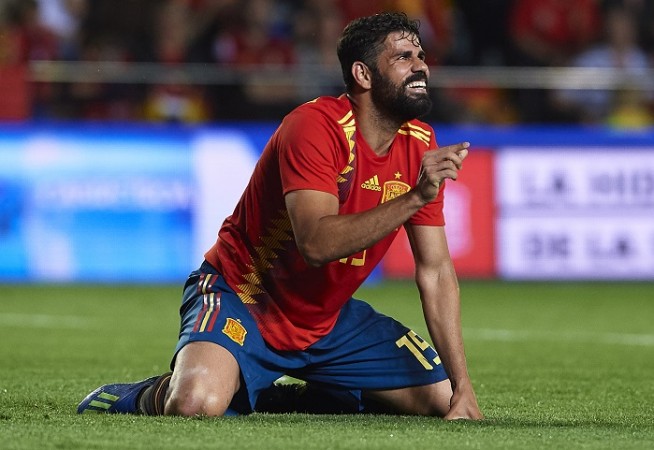
GROUP C
FRANCE
Goalkeepers: Hugo Lloris (Tottenham Hotspur)

Midfielders: Paul Pogba (Manchester United)
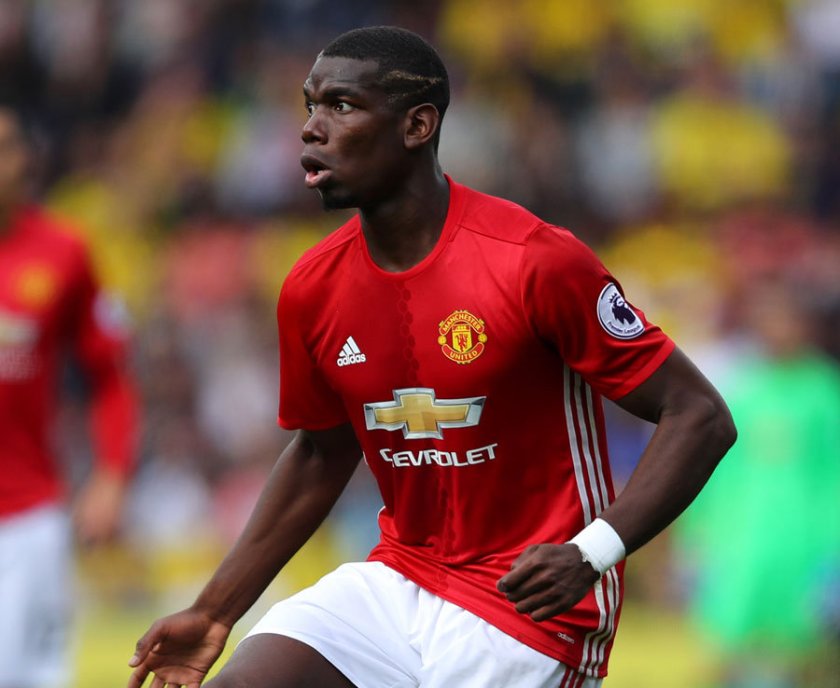
Forwards: Antoine Griezmann (Atletico Madrid)

DENMARK
Key players
Christian Eriksen: Christian Eriksen missed the 0-0 friendly against Sweden as he and his partner waited for the birth of their child; without him, Denmark looked very blunt. At Tottenham he has become irreplaceable and that is the case with his country too. From the number 10 role, he is a vital part of the attack, scoring 11 goals in his last 14 appearances for Denmark.
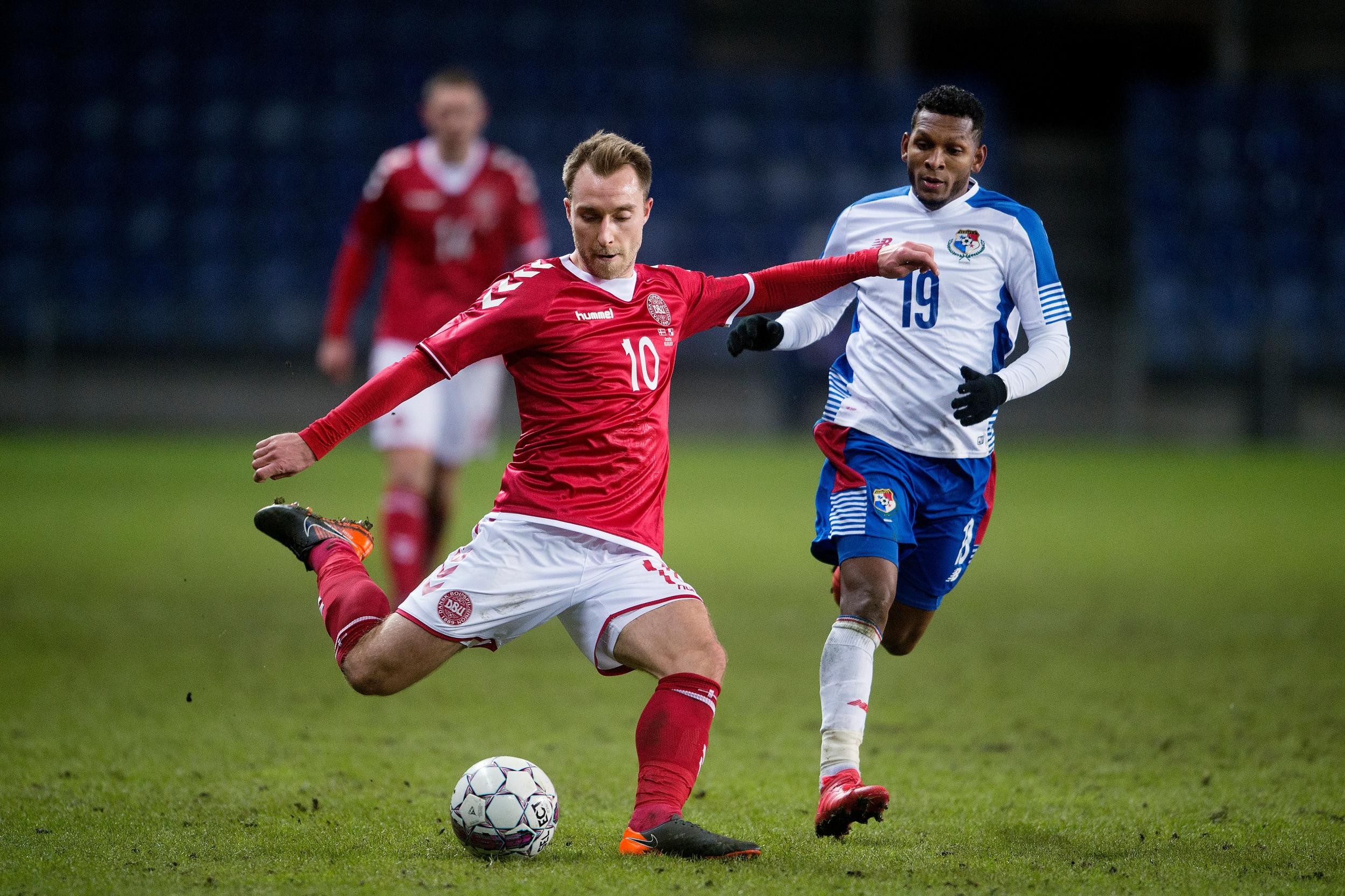
Andreas Christensen: Chelsea’s league season was fairly glum, however one player managed to stand out for the right reasons and the Blues may finally have a player from their academy who can step up to the first team in the long term. Antonio Conte said he can place “a lot of trust in Christensen” and says the 22-year-old shows “great maturity.”
Simon Kjaer: Denmark’s captain plays centre back for Sevilla and was part of the side which knocked Manchester United out of the Champions League, winning 2-1 at Old Trafford in the last 16. Kjaer took a while to settle into the Denmark squad after making his debut in 2009, but with time his performances have improved and his accurate long range passing has been used as a tactic to find forwards from deep.
Ones to watch
Yussuf Poulsen: A long term part the Red Bull Leipzig project in Germany, Yussuf Poulsen, 23, will have to step up his goals return following Bendtner’s injury. The tall and speedy forward is often used out wide by Denmark and Leipzig but can line up through the middle.
PERU
Key players
Jefferson Farfan: Jefferson Farfan may be the best known Peru player in Europe after spending seven years at Schalke. With the German club he won the DFB Pokal and DFL-Supercup as well as regularly appearing in the Champions League and Europa League. He scored from close range during Peru’s 2-0 win against Scotland but only hit four in qualification.
Paolo Guerrero: Despite his problematic preparations leading up to the World Cup, Paolo Guerrero is one of Peru’s most important players and their leading scorer. The 34 year-old forward spent an injury-hit four years at Bayern Munich and made 27 appearances for the first team before moving to Hamburg and then back to South America.
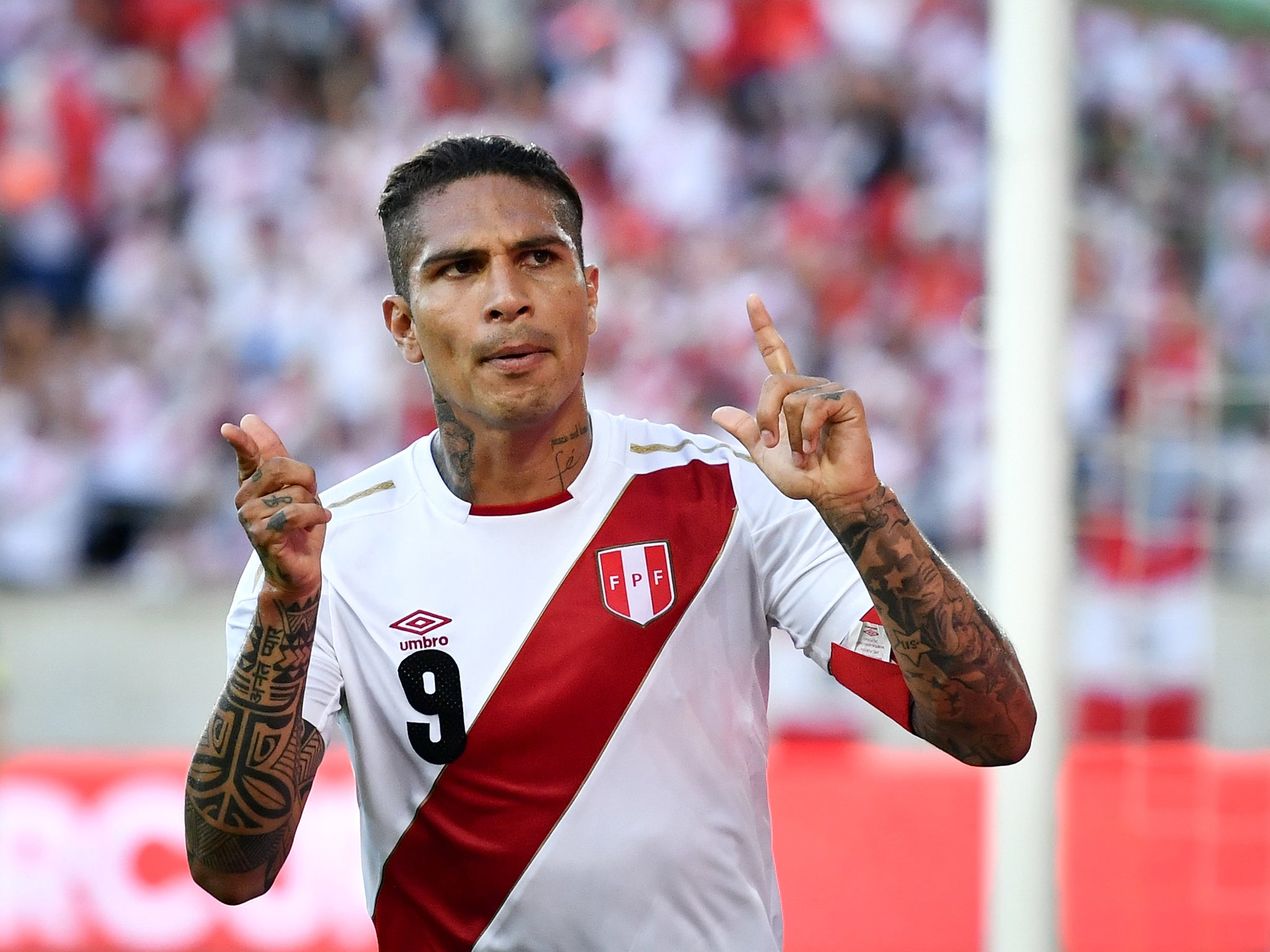
Andre Carillo: On loan at Watford, Andre Carrillo is the only Premier League representative in the Peru squad. He joined Benfica in 2016 as a promising winger and is beginning to make his mark on the international stage, with two goals in his four appearances for Peru in 2018.
One to watch
Christian Cueva: The joker in the pack, Christian Cueva is someone defenders will struggle to pick up because of his ability to drift into space and quickly change pace over short distances. The Sao Paulo midfielder looked very good against Scotland and scored a penalty in the 2-0 win.
GROUP D
ARGENTINA
Key players
Lionel Messi: Argentina’s road to the World Cup reinforced the notion that as long as you have the best player in the world on your side, you have a chance. Messi was the team’s top scorer in qualifying with seven goals despite featuring in just 10 of 18 matches; they failed to win any of the other eight games. Operating as a No10 behind Sergio Aguero, he will be at the heart of everything they do.

Sergio Aguero: Messi has been undermined in a succession of international finals by Gonzalo Higuain’s failure to convert key chances, so the form and fitness of his long-time friend Aguero will be crucial. Worryingly for Sampaoli the last two months of Manchester City’s season yielded few minutes for his first-choice striker, but there is no doubting Aguero’s raw ability and killer instinct.
Nicolas Otamendi: Heading into this tournament on the back of a career-best season at City, Otamendi is Argentina’s most accomplished and reliable defender by a distance. Much will be expected of him to hold an unconvincing backline together, particularly if Sampaoli asks his forwards and midfielders to press opponents high up the pitch in Russia.
CROATIA
Key players
Luka Modric: Croatia’s captain has established himself as one of the greatest playmakers of his generation since joining Real Madrid from Tottenham in 2012, elegantly controlling some of the very biggest matches with silky smooth passing and intelligent positioning. Expect him to operate slightly further forward than he does at club level, supplying Mandzukic as a more conventional No10.
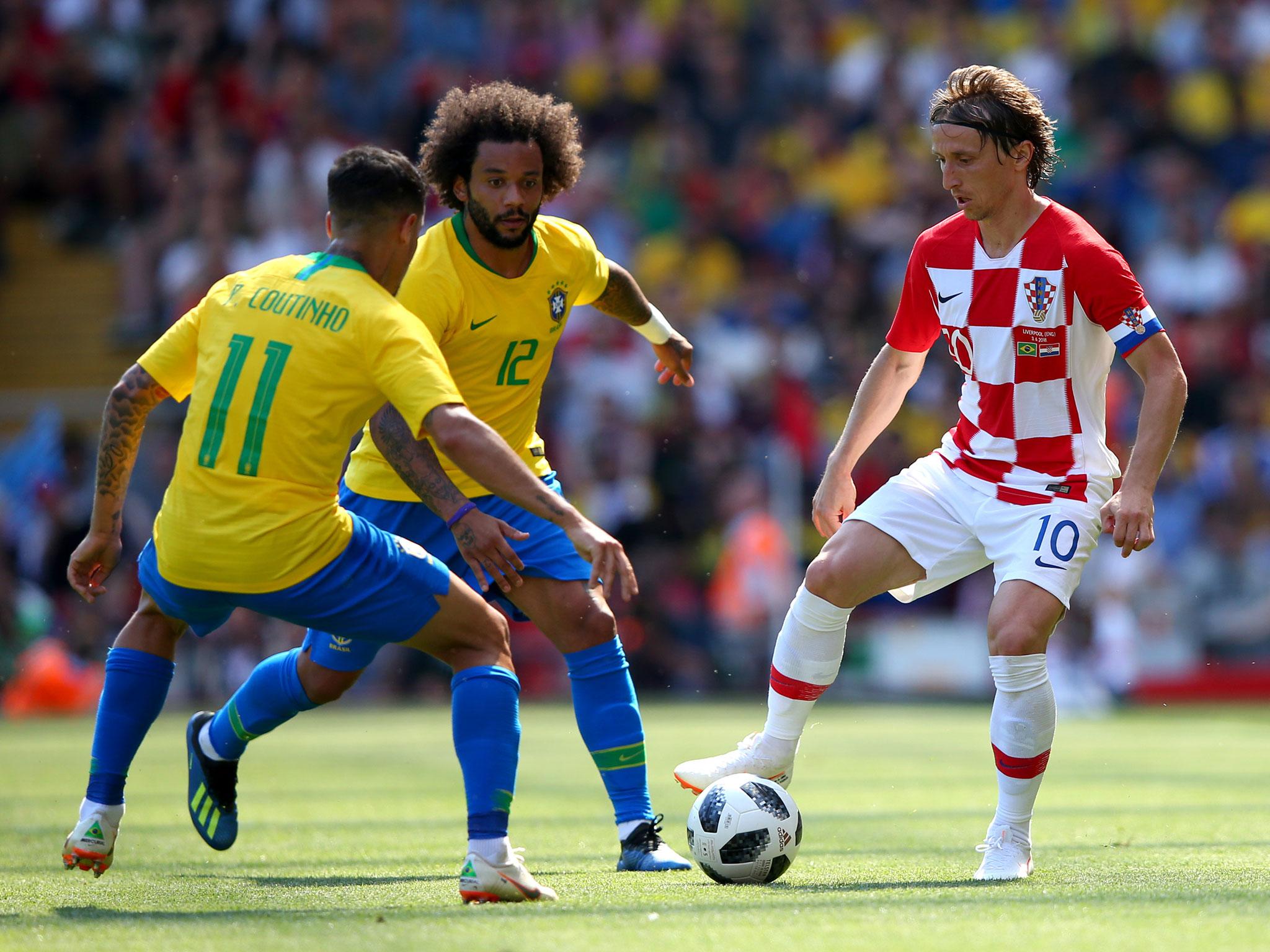
Ivan Rakitic: Barcelona’s continued dominance of Spanish football despite the loss of Xavi Hernandez is due in no small part to Rakitic. He has evolved into a complete midfielder at Camp Nou, capable of breaking up opposition attacks, building in possession and darting into the penalty area to score goals. Croatia may need him to showcase the full range of his skills if they are to succeed in Russia.
Ivan Perisic: Possession counts for little without penetration, and Perisic is the man charged with providing it in this Croatia team. The Inter star’s pace, skill and direct running stretches opponents, giving the likes of Modric and Rakitic more space in which to operate. He is also decisive in the final third, a fact underlined by 11 goals and nine assists in Serie A this season.
GROUP E
BRAZIL
Marquinhos
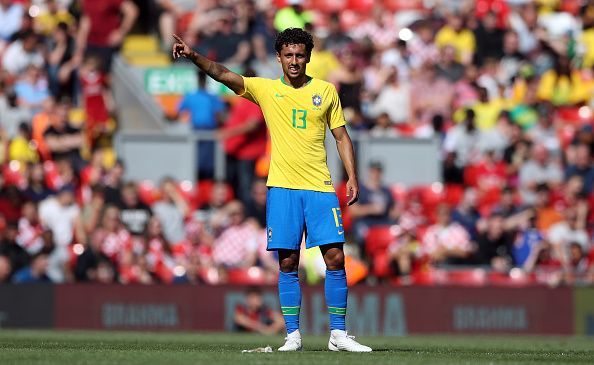
Position: Defender
Paris Saint-Germain defender Marquinhos will be making his first World Cup appearance next week. The 24-year-old is expected to partner PSG teammate and captain Thiago Silva at the centre of Brazil’s defence.
Marquinhos has had an excellent season himself and won the domestic treble with PSG. The Brazilian has been a mainstay in his club’s side and is no rookie. He is a solid presence at the back and could become the eventual successor of Thiago Silva at both club and international levels.
Casemiro
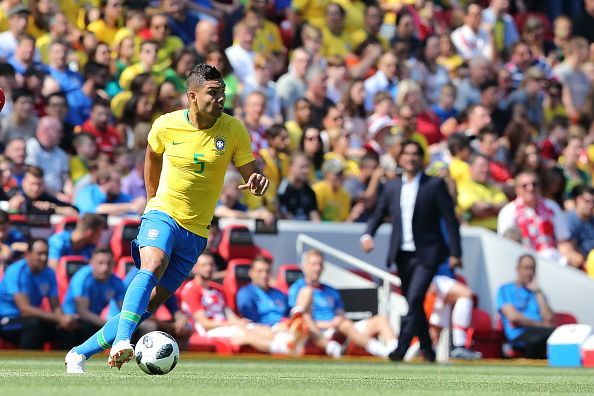
Position: Defensive Midfielder
Casemiro’s quick rise to fame at Real Madrid over the last 3 years was bound to force coach Tite to include him in the squad. Over the past two years, he has become a prominent part of the Real Madrid side and has made 48 appearances this season.
In 3 years, he has won 11 major titles at the club level and has become one of the best defensive midfielders in the world. However, he has only made 23 appearances for Brazil since 2011 and isn’t very experienced on the international stage.
He will have to compete with Manchester City’s Fernandinho for a spot in the side, but after winning the third consecutive Champions League title, Casemiro is bound to be high on confidence and Tite will do well to tap into it.
Philippe Coutinho
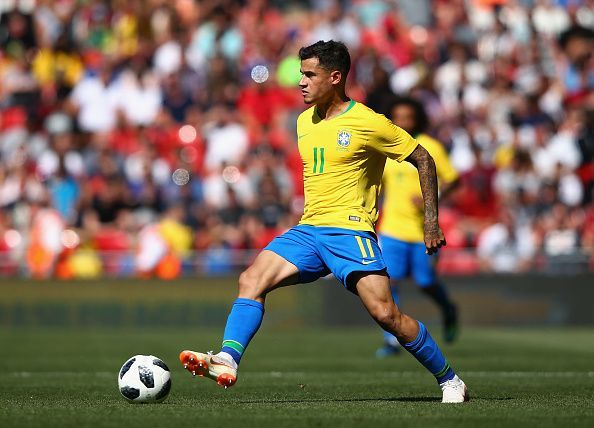
Position: Attacking midfielder
Philippe Coutinho’s widely covered transfer from Liverpool to Barcelona for a fee of €120 made him the second most expensive footballer till date (until Kylian Mbappe signs a permanent deal with PSG)
Over the course of the season, Coutinho played 20 games across all competitions, scoring 12 goals before going on to play 22 games for Barcelona, scoring 10. He also helped Barcelona lift the La Liga and Copa del Rey trophies.
Expect him to link up wonderfully with Neymar and co. to wreak havoc on opposition defenders at the World Cup.
Gabriel Jesus
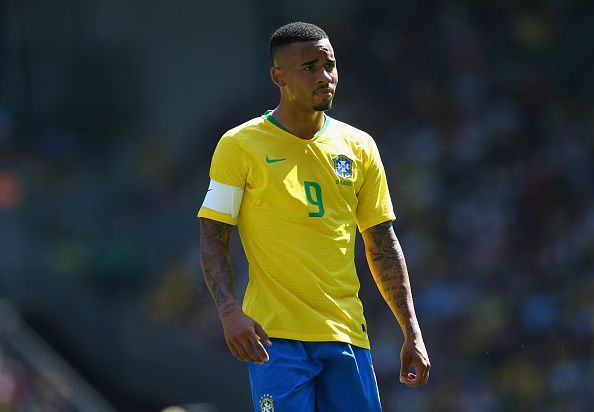
Position: Striker
Last year, a picture of Gabriel Jesus went viral on the internet. It was a picture of him painting the streets of Brazil before the 2014 World Cup. Since then, Jesus has seen his life change like he couldn’t even have imagined.
After excellent performances for Palmeiras, Jesus joined Manchester City in 2016 for a reported fee of €33 million plus add-ons. Under Pep Guardiola’s guidance, he slowly displaced Sergio Aguero as the club’s leading striker during the 2017/18 season.
The 21-year-old has grabbed every opportunity given to him and is also expected to be favoured to spearhead the attack in Russia. He is a prolific goal scorer and an exciting talent, capable of singlehandedly winning games on his day. He could certainly light the World Cup up.
This season, Jesus scored 19 goals and assisted 3 more across all competitions – phenomenal stats for someone who is just 21-years-old and was also hindered by injuries.
Neymar
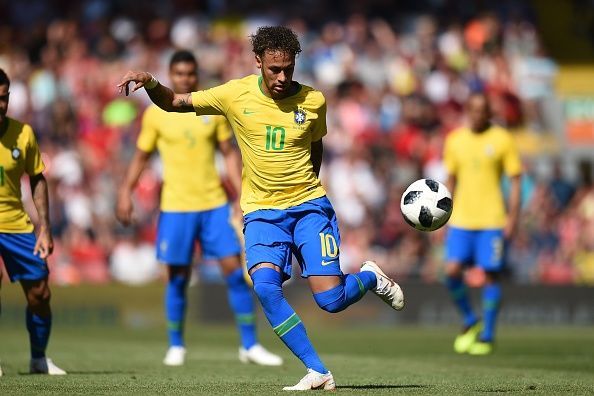
Position: Winger
Neymar is the world’s most expensive player for a reason. The uber-talented Brazilian achieved great things at Barcelona, learning from Lionel Messi, before moving to PSG for a world-record transfer fee of €222 million.
It didn’t take long for Neymar to make the Ligue 1 his own as he immediately started terrorizing defences for fun. Despite missing months of action due to injury, Neymar played 30 games across all competitions for PSG this season, scoring a stunning tally of 28 goals and assisting 16 more.
The Brazilian superstar is, by far, the best footballer in the world after Cristiano Ronaldo and Lionel Messi, and if he continues this way, he may just soon surpass the two legends. Neymar has returned to fitness and is expected to play a complete ro in Brazil’s campaign.
Expect him to go all out during the tournament, cause winning it will certainly give him a solid chance at winning the Ballon d’Or and finally ending the Messi-Ronaldo duopoly.
COSTARICA
Best Player
Navas, the man in net for Real Madrid. The 31-year-old is one of the to goalkeepers in the world with his cat-like reactions. He can be the difference maker for this team and will likely have to step up more than usual due to a suspect defense.
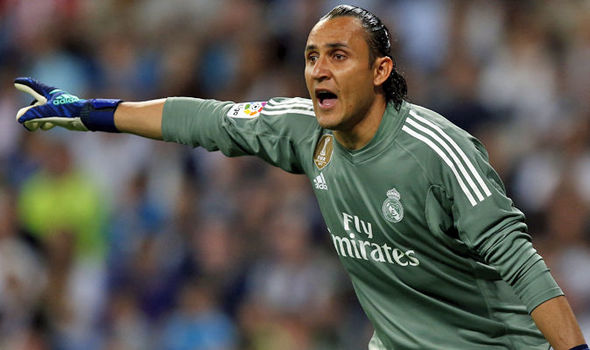
Player to watch
Joel Campbell. It’s hard to imagine that he is just 25 years of age, as it feels like we’ve been hearing about him as the next big Central American star ever since he joined Arsenal in 2011. He’s gone on loan six times since and didn’t play much at Real Betis last season. He’ll be fresh, but how will his form be?
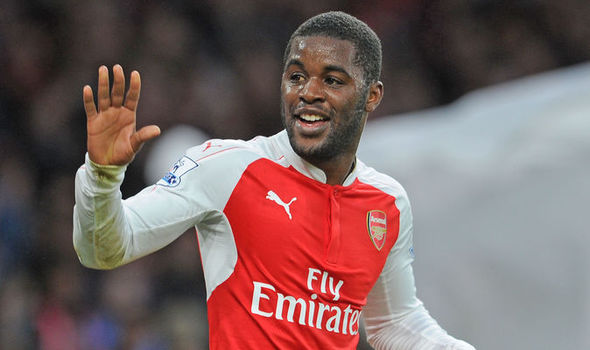
GROUP F
THE GROUP OF DEATH
GERMANY
Key players
Mesut Ozil: Ozil did not have a vintage European Championship as Germany crashed out in the semi-final against Germany, and he scored just once in their World Cup qualifying campaign. After coming off in the 76th minute in a recent friendly against Austria, the German Football Federation confirmed the Arsenal midfielder was suffering from a bruised knee and has spent some time training alone.
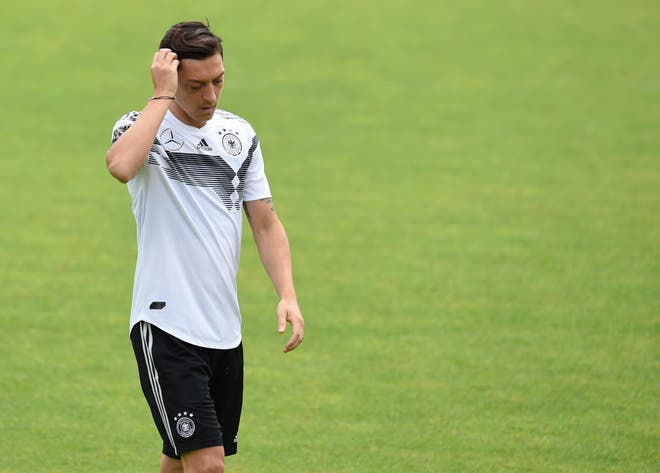
Manuel Neuer: Despite making just four appearances for Bayern Munich this season after a foot fracture prematurely ended his season in September, Low announced that Manuel Neuer will be Germany’s first choice goalkeeper in the World Cup. Neuer won the Golden Glove award, the prize given to the best goalkeeper, in the previous World Cup for his outstanding range of saves and distribution.

Thomas Muller: Whether he is played as a striker, midfielder or winger, Thomas Muller has always been an important part of how Germany play. His intelligence, professionalism, creativity and finishing has made him one of the most successful current players, having won everything there is to win domestically. “Today, given my experience, I try to be a positive influence on the other players,” said Muller, who now has the unusual responsibility of being an experienced player in a German squad
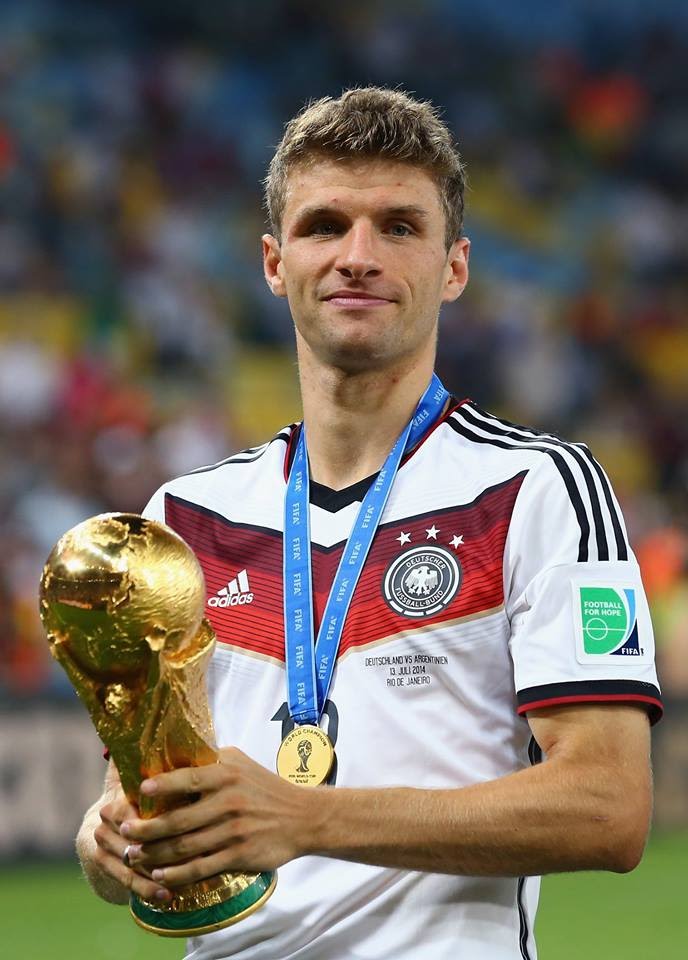
MEXIOCO
Key players
Javier Hernandez: Mexico’s best ever striker is one away from 50 goals, but carries mixed form into the tournament. A lot of Hernandez’s time at West Ham was spent on the bench, but he always looked lively whenever he was used. Hernandez responded with a straightforward “yes” when asked if he sees himself holding the trophy and believes Mexico can become champions.
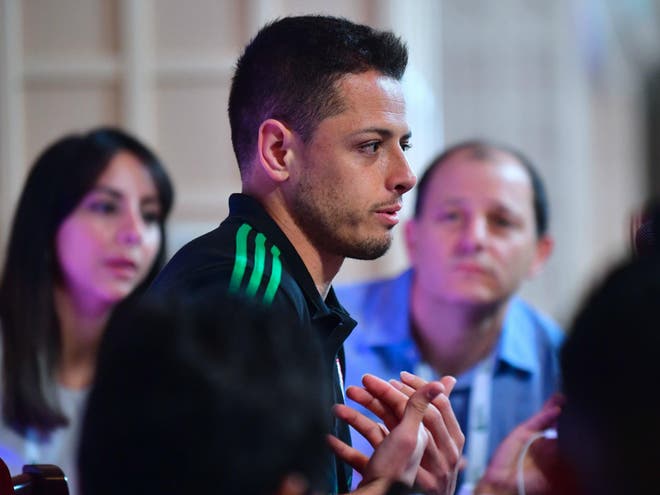
Giovani dos Santos: The former Barcelona and Tottenham midfielder has found his feet at LA Galaxy after spending a decade in Europe. He starred as Mexico won gold in the 2012 London Olympics and has been a consistent part of the Mexican setup since making his debut in 2007.
Andres Guardado: The member of the current squad with the highest caps is an experienced international and heading to his fourth World Cup. Andres Guardado has scored some important goals for Mexico from left midfield, including a strike against Croatia in Brazil 2014 to put Mexico into the quarter-finals.
South Korea
Key players
Son Heung-min: Son Heung-min has become arguably one of the best players that South Korea has ever produced. His performances for Spurs get better each year and the much loved versatile midfielder will play a big part in determining whether South Korea can advance from their group.
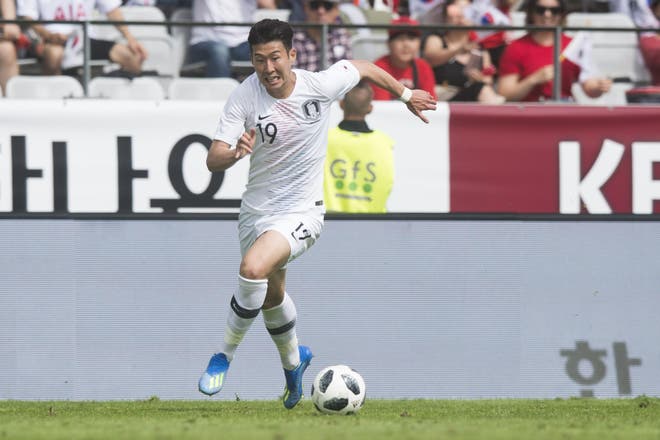
Lee Chung-yong: It has been a frustrating last couple of years at Crystal Palace for Lee Chung-yong who has mainly been used as a squad player and he missed out on some recent South Korea friendlies due to his lack of fitness. He was South Korea’s joint highest goal scorer with two goals in the 2010 South Africa tournament where they lost in the round of 16.
Park Joo-ho: A stand-out player in South Korea’s Asia Cup triumph in 2015, Park Joo-ho has a wealth of experience behind him, both internationally and in Europe. He briefly played for Borussia Dortmund, but made a name for himself playing for Mainz and Basel, and was a part of the Basel team that beat Manchester United to stop them advancing from the group stage of the Champions League in 2011.
GROUP G
BELGIUM
Eden Hazard: A disrupted and disappointing season yielded the second-worst goal tally of Hazard’s career at Chelsea, but he showed ominous signs of life in the final stretch of the campaign. His ability to commit defenders, force mistakes and create for himself or others will be particularly crucial against the massed defences Belgium are likely to face in the group stage.
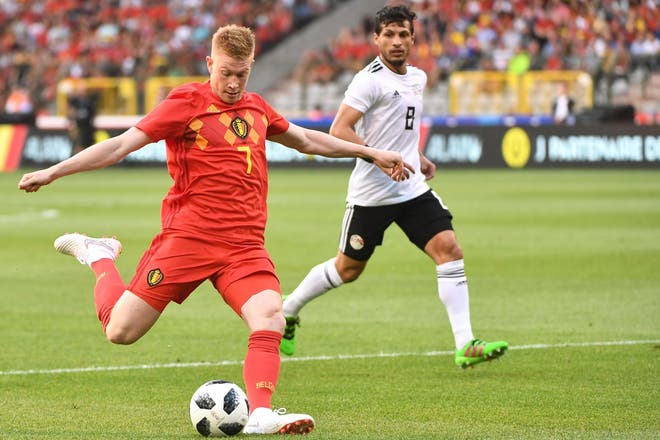
Kevin De Bruyne: Unlucky to be pipped by Mohamed Salah in the race for English football’s top individual honours this season, De Bruyne goes into the World Cup as a Premier League champion and in the form of his life. He sees passes that do not even occur to most other players and when his game clicks into top gear, no defence can stop him.
Jan Vertonghen: Kompany’s fitness issues, coupled with Martinez’s decision to name only six natural defenders in his World Cup squad, ensure that Vertonghen’s steadying influence at the back will be all the more vital. He is mobile and versatile enough to shift to the left if Yannick Ferreira Carrasco proves too much of a liability, and his understanding with Tottenham teammate Toby Alderweireld is also a plus.
ENGLAND
TRENT ALEXANDER-ARNOLD (Club: Liverpool)
Easily one of the biggest stars to break out of the English Premier League last season was Trent Alexander-Arnold.
Playing for Liverpool, the youngster has been composed in the defence and has also shown his capabilities when transitioning on the attack.
Only 22 years old, Alexander-Arnold already appears to have the calm demeanour that will help the Three Lions in the World Cup and should be a regular fixture in their games.
An ability to watch out for is for his crosses that should be perfect for the offence to pick on.
GARY CAHILL (Club: Chelsea)
One of the veteran presences in the team is Chelsea defender Gary Cahill.
He had a subpar season with the Blues in the EPL but expect him to be more reliable as the Three Lions take on opposing football nations.
Winning the FA Cup against Manchester United may help him in regaining the confidence he needs and it has come in an opportune time as he will hold the line for England and many will rely on him to pick up the slack when the defence becomes sloppy.
What he brings to the table is the experience that previous star defenders like John Terry and Rio Ferdinand once brought when they suited up for the national team.
RAHEEM STERLING (Club: Manchester City)
In a game that is ever-changing, pace is important in the line-up. This is exactly what Raheem Sterling provides the Three Lions in the FIFA World Cup.
He had a great season with Manchester City, helping the team win the Premier League trophy at the end of the season and pace along the flanks should help England especially when trying to mount an offence.
A regular starter for the team since 2013, there is little doubt that Southgate has a lot of faith in the midfielder and it should be handsomely repaid in Russia.
His ability to perform under immense pressure should help the team in tight squeezes especially in the group stages.
DELE ALLI (Club: Tottenham Hotspur)
Helping the Tottenham Hotspur finish third in the Premier League and securing UEFA Champions League football next season is Dele Alli.
Only 20 years old, Alli has played an important role with the club and is looking to extend his help in Russia in the World Cup.
England will definitely benefit from his precise passing and how he is able to stabilise the midfield especially to link with the attack.
With him being especially familiar with his teammate Harry Kane, they can link up and provide opposing defences a lot of problems in the competition. In addition, Alli has a good eye for goal especially in long range attempts which should come in handy in dead ball situations.
HARRY KANE (Club: Tottenham Hotspur)
Last but certainly not the least is Harry Kane.
He is arguably the best player for the Three Lions this year and much will be on his shoulders as he looks to lift the national squad to success.
The Tottenham Hotspur star had another incredible season with his club and much of the attention is now set on how he will perform for the national squad.
At 24 years old, he is still getting better and having the performance of his life in Russia should have everyone looking at him by the end of the competition. Kane has scored at least 30 times in the Premier League in four straight seasons and is capable of leading the line for the Englishmen.
GROUP H
Group H is one of the more balanced groups in the World Cup and picking a favourite among Poland, Japan, Senegal and Colombia is a tricky task.
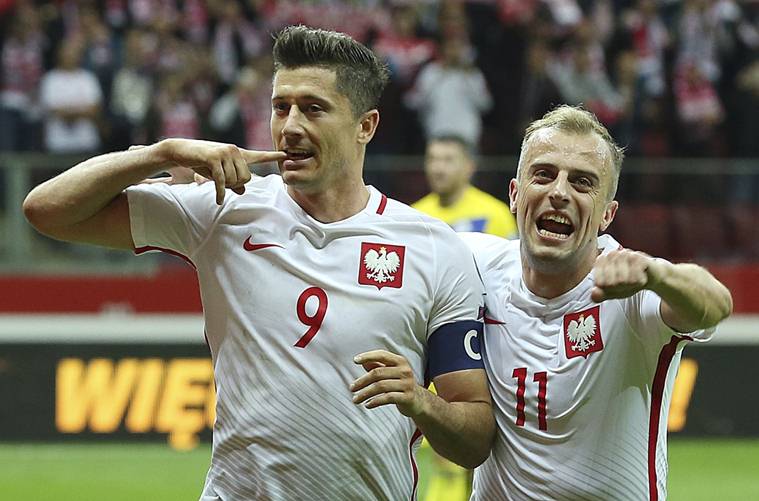 Coach Adam Nawalka has centered his team around Robert Lewandowski. (Source: AP)
Coach Adam Nawalka has centered his team around Robert Lewandowski. (Source: AP)
Poland
The fact that Poland topped its FIFA World Cup qualifying group was not much of a surprise to anyone – after all their forward line features one of the most lethal goalscorers in world football – Robert Lewandowski. The Bayern Munich striker broke the European record as he scored a total of 16 goals in the World Cup qualifiers. Since Adam Nawalka took over the reigns of Poland team in 2013, the Bialo-Czerwoni have become all about the 29-year old. Nawalka has centered his team around Lewandowski with Arkadiusz Milik as his ally, followed by Jakub Blaszczykowski and Kamil Grosicki in the middle, who are given the task to pass the ball to the two-man front line. The formation worked in the Euro Cup 2016 where Poland reached the quarterfinals. Lewandowski has scored 34 goals in 36 games under Nawalka. Poland, who are at no. 10 position as per the FIFA Rankings, have qualified for World Cup for the first time since 2006. With Lewandowski up top, who has scored 106 goals over last four years at Bayern Munich, they are the favourites to qualify to Round of 16 from Group H. There are, though, defensive concerns for the side, with Monaco’s Kamil Glik picking up an injury and being left out of the squad. Goalkeeper Wojciech Szczesny, who remained a second-choice over Gianluigi Buffon at Juventus last season, and Lukasz Fabianski, who plied his trade at now-relegated Swansea City, do not give much confidence either.
Senegal
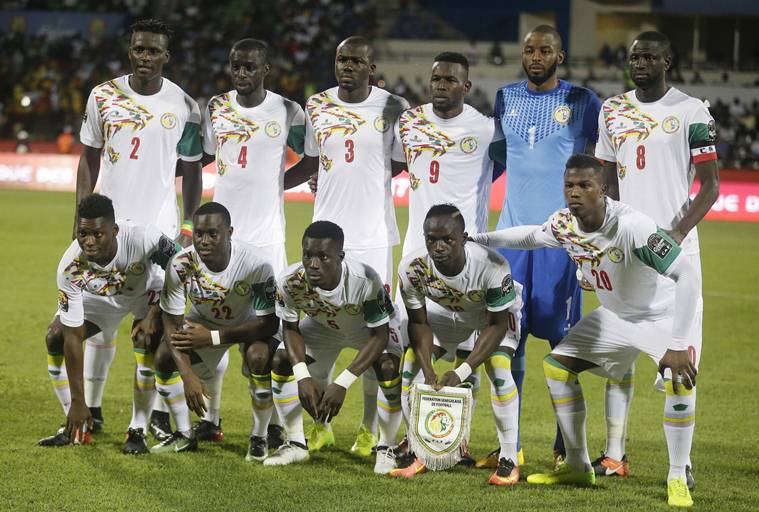 Up front there is Liverpool’s Sadio Mane, who can run down any opposition with his speed, and possesses the ability to dribble past the defence. (Source: AP)
Up front there is Liverpool’s Sadio Mane, who can run down any opposition with his speed, and possesses the ability to dribble past the defence. (Source: AP)
The last time Senegal qualified for the World Cup, in 2002, they ran over European giants such as France and made it into the quarterfinals. The captain of the 2002-side Aliou Cisse has now taken over the reigns as coach. Even though the African nation are placed at the 27th position in FIFA Rankings, and lack experience of top-level football, the squad is packed with some of the most popular stars currently in club football. Up front there is Liverpool’s Sadio Mane, who can run down any opposition with his speed, and possesses the ability to dribble past the defence. He will be supported by the likes of Monaco’s Keita Balde, who has been a constant transfer target for top European clubs because of his tremendous skills. Add Mbaye Niang and Diafra Sakho to the mix, and Senegal’s attacking forces appear pretty strong. With Idrissa Gueye and Cheikhou Kouyate in the midfield, and the experienced Kalidou Koulibaly in defence, the African nation boast of a strong squad. But the lack of experience can hurt them in Russia, as they battle the heavy odds stacked against them.
Colombia
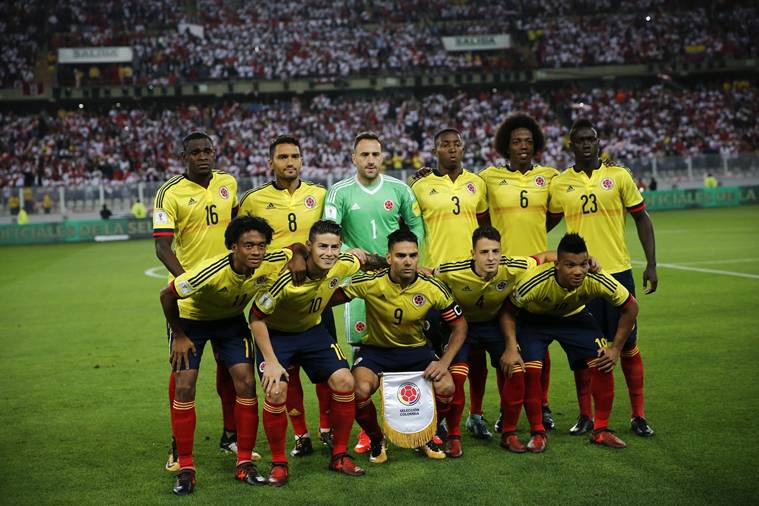 Colombia have come a long way since being known just for Radamel Falcao. (Source: AP)
Colombia have come a long way since being known just for Radamel Falcao. (Source: AP)
Colombia’s FIFA World Cup squad appears to be a good mix of experienced campaigners and the rising superstars. Once, the South American nation was known for the prolific striker Radamel Falcao, who is undoubtedly one of the biggest stars to come out from the country. But, in his absence, James Rodriguez, who won the Golden Ball for scoring six goals four years ago, has become the star for Los Cafeteros. In the back line, Barcelona’s Yerry Mina and Tottenham’s Davison Sanchez have grown to be the a force. With the experienced Frank Fabra suffering an injury and getting ruled out from the squad, the two will have larger responsibility on their shoulder. Arsenal’s David Ospina provides experience between the posts, and Sevilla’s Luis Muriel offers solid support to Falcao up front. But the problem with the squad appears to be in the midfield. Despite the presence of players such as Espanyol’s Carlos Sanchez and Juventus’ Juan Cuadrado, Colombia have only scored 21 goals in 18 World Cup qualifying matches, which exposed the lack of creativity in their midfield. The experienced duo of Sanchez and Abel Aguilar failed to provide much dynamism, and the side were heavily dependent on James to run from back to front, which marred his ability to get inside the box to make awkwardly accurate shoots. Colombia are touted to be the favourites to enter the group stage, but the lack of oomph-factor in the midfield, and dependence on Rodriguez might hurt their chances.
Japan
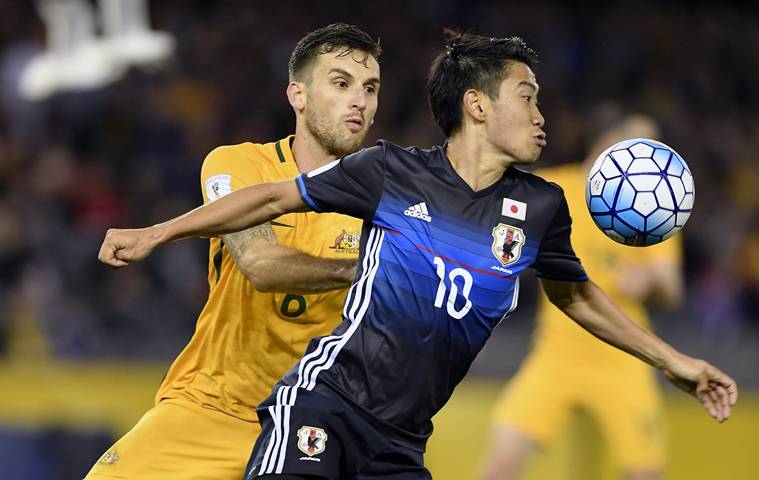 The midfield line of Shinji Kagawa and Keisuke Honda appear to be a strong set up. (Source: AP)
The midfield line of Shinji Kagawa and Keisuke Honda appear to be a strong set up. (Source: AP)
The problems with 61st ranked Japan side appeared with the sacking of coach Vedran Halilovic just a few weeks before the start of the World Cup. The newly-appointed Akira Nishino played it extremely safe with the squad selection, picking experienced players over promising talent. The midfield line of Shinji Kagawa and Keisuke Honda appear to be a strong set up. But the former went through a rough patch for Borussia Dortmund, and did not enjoy many first-team starts due to injury concerns. Honda, on the other hand, is a versatile player, who can run down the opposition with strong challenges. But he has lost a bit of speed with age. Even with the squad filled with veterans, Japan are at a risk of having too many 30-plus players on the field. For Japan, against a much agile Senegal, Colombia and Poland, it seems a difficult task to make it past the group stages.
DETAILED SQUAD LIST FOR ALL TEAMS FOR FIFA RUSSIA 2018
Group A
Russia’s 23-man final squad: Igor Akinfeev, Vladimir Gabulov, Andrey Lunev; Sergei Ignashevich, Mario Fernandes, Vladimir Granat, Fyodor Kudryashov, Andrei Semyonov, Igor Smolnikov, Ilya Kutepov, Aleksandr Yerokhin, Yuri Zhirkov, Daler Kuzyaev, Aleksandr Golovin, Alan Dzagoev, Roman Zobnin, Aleksandr Samedov, Yuri Gazinsky, Anton Miranchuk, Denis Cheryshev, Artyom Dzyuba, Aleksei Miranchuk, Fyodor Smolov.
Saudi Arabia’s 23-man final squad: Mohammed Al-Owais, Yasser Al-Musailem, Abdullah Al-Mayuf; Mansoor Al-Harbi, Yasser Al-Shahrani, Mohammed Al-Burayk, Motaz Hawsawi, Osama Hawsawi, Ali Al-Bulaihi, Omar Othman; Abdullah Alkhaibari, Abdulmalek Alkhaibri, Abdullah Otayf, Taiseer Al-Jassam, Hussain Al-Moqahwi, Salman Al-Faraj, Mohamed Kanno, Hatan Bahbir, Salem Al-Dawsari, Yahia Al-Shehri; Fahad Al-Muwallad, Mohammad Al-Sahlawi, Muhannad Assiri
Egypt’s 23-man final squad : Essam El Hadary, Mohamed El-Shennawy, Sherif Ekramy; Ahmed Fathi, Abdallah Said, Saad Samir, Ayman Ashraf, Mohamed Abdel-Shafy, Ahmed Hegazi, Ali Gabr, Ahmed Elmohamady, Omar Gaber; Tarek Hamed, Mahmoud Shikabala, Sam Morsy, Mohamed Elneny, Mahmoud Kahraba, Ramadan Sobhi, Trezeguet, Amr Warda; Marwan Mohsen, Mohamed Salah, Mahmoud Elwensh.
Uruguay’s 23-man final squad: Fernando Muslera, Martin Silva, Martin Campana, Diego Godin, Sebastian Coates, Jose Maria Gimenez, Maximiliano Pereira, Gaston Silva, Martin Caceres, Guillermo Varela, Nahitan Nandez, Lucas Torreira, Matias Vecino, Rodrigo Bentancur, Carlos Sanchez, Giorgian De Arrascaeta, Diego Laxalt, Cristian Rodriguez, Jonathan Urretaviscaya, Cristhian Stuani, Maximiliano Gomez, Edinson Cavani, Luis Suarez
Group B
Portugal’s 23-man final squad : Anthony Lopes, Beto, Rui Patricio, Bruno Alves, Cedric Soares, Jose Fonte, Mario Rui, Pepe, Raphael Guerreiro, Ricardo Pereira, Ruben Dias, Adrien Silva, Bruno Fernandes, Joao Mario, Joao Moutinho, Manuel Fernandes, William Carvalho, Andre Silva, Bernardo Silva, Cristiano Ronaldo, Gelson Martins, Goncalo Guedes, Ricardo Quaresma
Spain’s 23-man final squad: David de Gea, Pepe Reina, Kepa Arrizabalaga; Dani Carvajal, Alvaro Odriozola, Gerard Pique, Sergio Ramos, Nacho, Cesar Azpilicueta, Jordi Alba, Nacho Monreal; Sergio Busquets, Saul Niquez, Koke, Thiago Alcantara, Andres Iniesta, David Silva; Isco, Marcio Asensio, Lucas Vazquez, Iago Aspas, Rodrigo, Diego Costa.
Morocco’s 23-man final squad: Mounir El Kajoui, Yassine Bounou, Ahmad Reda Tagnaouti, Mehdi Benatia, Romain Saiss, Manuel Da Costa, Badr Benoun, Nabil Dirar, Achraf Hakimi, Hamza Mendyl; M’bark Boussoufa, Karim El Ahmadi, Youssef Ait Bennasser, Sofyan Amrabat, Younes Belhanda, Faycal Fajr, Amine Harit; Khalid Boutaib, Aziz Bouhaddouz, Ayoub El Kaabi, Nordin Amrabat, Mehdi Carcela, Hakim Ziyech
Iran’s 23-man final squad: Alireza Beiranvand, Rashid Mazaheri, Amir Abedzadeh; Ramin Rezaeian, Mohammad Reza Khanzadeh, Morteza Pouraliganji, Pejman Montazeri, Seyed Majid Hosseini, Milad Mohammadi, Roozbeh Cheshmi; Saeid Ezatolahi, Masoud Shojaei, Saman Ghoddos, Mehdi Torabi, Ashkan Dejagah, Omid Ebrahimi, Ehsan Hajsafi, Vahid Amiri; Alireza Jahanbakhsh, Karim Ansarifard, Mahdi Taremi, Sardar Azmoun, Reza Ghoochannejhad.
Group C
France’s 23-man final squad: Alphonse Areola, Hugo Lloris, Steve Mandanda; Lucas Hernandez, Presnel Kimpembe, Benjamin Mendy, Benjamin Pavard, Adil Rami, Djibril Sidibe, Samuel Umtiti, Raphael Varane; N’Golo Kante, Blaise Matuidi, Steven N’Zonzi, Paul Pogba, Corentin Tolisso, Ousmane Dembele, Nabil Fekir; Olivier Giroud, Antoine Griezmann, Thomas Lemar, Kylian Mbappe, Florian Thauvin
Australia’s 23-man final squad: Brad Jones, Mat Ryan, Danny Vukovic; Aziz Behich, Milos Degenek, Matthew Jurman, James Meredith, Josh Risdon, Trent Sainsbury; Jackson Irvine, Mile Jedinak, Robbie Kruse, Massimo Luongo, Mark Milligan, Aaron Mooy, Tom Rogic; Daniel Arzani, Tim Cahill, Tomi Juric, Mathew Leckie, Andrew Nabbout, Dimitri Petratos, Jamie Maclaren.
Peru’s 23-man final squad: Carlos Caceda, Jose Carvallo, Pedro Gallese, Luis Advincula, Pedro Aquino, Miguel Araujo, Andre Carrillo, Wilder Cartagena, Aldo Corzo, Christian Cueva, Jefferson Farfan, Edison Flores, Paolo Hurtado, Nilson Loyola, Andy Polo, Christian Ramos, Alberto Rodriguez, Raul Ruidiaz, Anderson Santamaria, Renato Tapia, Miguel Trauco, Yoshimar Yotun, Paolo Guerrero
Denmark’s 23-man final squad: Kasper Schmeichel, Jonas Lossl, Frederik Ronow; Simon Kjaer, Andreas Christensen, Mathias Jorgensen, Jannik Vestergaard, Henrik Dalsgaard, Jens Stryger, Jonas Knudsen; William Kvist, Thomas Delaney, Lukas Lerager, Lasse Schone, Christian Eriksen, Michael Krohn-Dehli; Pione Sisto, Martin Braithwaite, Andreas Cornelius, Viktor Fischer, Yussuf Poulsen, Nicolai Jorgensen, Kasper Dolberg.
Group D
Argentina’s 23-man final squad : Nahuel Guzmán, Willy Caballero, Franco Armani; Gabriel Mercado, Nicolas Otamendi, Federico Fazio, Nicolas Tagliafico, Marcos Rojo, Marcos Acuna, Cristian Ansaldi, Eduardo Salvio; Javier Mascherano, Angel Di Maria, Ever Banega, Lucas Biglia, Manuel Lanzini, Gio Lo Celso, Maximiliano Meza; Lionel Messi, Sergio Aguero, Gonzalo Higuain, Paulo Dybala, Cristian Pavon.
I celand’s 23-man final squad: Hannes Thor Halldorsson, Runar Alex Runarsson, Frederik Schram; Kari Arnason, Ari Freyr Skulason, Birkir Mar Saevarsson, Sverrir Ingi Ingason, Hordur Magnusson, Holmar Orn Eyjolfsson, Ragnar Sigurdsson; Johann Berg Gudmundsson, Birkir Bjarnason, Arnor Ingvi Traustason, Emil Hallfredsson, Gylfi Sigurdsson, Olafur Ingi Skulason, Rurik Gislason, Samuel Fridjonsson, Aron Gunnarsson; Alfred Finnbogason, Bjorn Bergmann Sigurdarson, Jon Dadi Bodvarsson, Albert Gudmundsson
Croatia’s 23-man final squad: Danijel Subasic, Lovre Kalinic, Dominik Livakovic; Vedran Corluka, Domagoj Vida, Ivan Strinic, Dejan Lovren, Sime Vrsaljko, Josip Pivaric, Tin Jedvaj, Duje Caleta-Car; Luka Modric, Ivan Rakitic, Mateo Kovacic, Milan Badelj, Marcelo Brozovic, Filip Bradaric; Mario Mandzukic, Ivan Perisic, Nikola Kalinic, Andrej Kramaric, Marko Pjaca, Ante Rebic.
Nigeria’s 23-man final squad: Ikechukwu Ezenwa, Daniel Akpeyi, Francis Uzoho; William Troost-Ekong, Leon Balogun, Kenneth Omeruo, Bryan Idowu, Chidozie Awaziem, Abdullahi Shehu, Elderson Echiejile, Tyronne Ebuehi; John Obi Mikel, Ogenyi Onazi, John Ogu, Wilfred Ndidi, Oghenekaro Etebo, Joel Obi; Odion Ighalo, Ahmed Musa, Victor Moses, Alex Iwobi, Kelechi Iheanacho, Simeon Nwankwo.
Group E
Brazil’s 23-man final squad: Alisson, Ederson, Cassio; Danilo, Fagner, Marcelo, Filipe Luis, Thiago Silva, Marquinhos, Miranda, Pedro Geromel; Casemiro, Fernandinho, Paulinho, Fred, Renato Augusto, Philippe Coutinho, Willian, Douglas Costa; Neymar, Taison, Gabriel Jesus, Roberto Firmino
Switzerland’s 23-man final squad: Roman Burki, Yvon Mvogo, Yann Sommer; Manuel Akanji, Johan Djourou, Nico Elvedi, Michael Lang, Stephan Lichtsteiner, Jacques-Francois Moubandje, Ricardo Rodriguez, Fabian Schaer; Valon Behrami, Blerim Dzemaili, Gelson Fernandes, Remo Freuler, Xherdan Shaqiri, Granit Xhaka, Steven Zuber, Denis Zakaria; Josip Drmic, Breel Embolo, Mario Gavranovic, Haris Seferovic
Costa Rica’s 23-man final squad: Keylor Navas, Patrick Pemberton, Leonel Moreira, Cristian Gamboa, Ian Smith, Ronald Matarrita, Bryan Oviedo, Oscar Duarte, Giancarlo Gonzalez, Francisco Calvo, Kendall Waston, Johnny Acosta, David Guzman, Yeltsin Tejeda, Celso Borges, Randall Azofeifa, Rodney Wallace, Bryan Ruiz, Daniel Colindres, Christian Bolanos, Johan Venegas, Joel Campbell, Marco Urena
Serbia’s 23-man final squad: Vladimir Stojkovic, Predrag Rajkovic, Marko Dmitrovic, Aleksandar Kolarov, Antonio Rukavina, Milan Rodic, Branislav Ivanovic, Uros Spajic, Milos Veljkovic, Dusko Tosic, Nikola Milenkovic; Nemanja Matic, Luka Milivojevic, Marko Grujic, Dusan Tadic, Andrija Zivkovic, Filip Kostic, Nemanja Radonjic, Sergej Milinkovic-Savic, Adem Ljajic; Aleksandar Mitrovic, Aleksandar Prijovic, Luka Jovic
Group F
Germany’s 23-man final squad : Manuel Neuer, Marc-Andre ter Stegen, Kevin Trapp; Jerome Boateng, Matthias Ginter, Jonas Hector, Mats Hummels, Joshua Kimmich, Marvin Plattenhardt, Antonio Rudiger, Niklas Sule; Julian Brandt, Julian Draxler, Mario Gomez, Leon Goretzka, Ilkay Gundogan, Sami Khedira, Toni Kroos, Thomas Muller, Mesut Ozil, Marco Reus, Sebastian Rudy, Timo Werner.
Mexico’s 23-man final squad : Jesus Corona, Alfredo Talavera, Guillermo Ochoa; Hugo Ayala, Carlos Salcedo, Diego Reyes, Miguel Layun, Hector Moreno, Edson Alvarez; Rafael Marquez, Jonathan dos Santos, Marco Fabian, Giovani dos Santos, Hector Herrera, Andres Guardado; Raul Jimenez, Carlos Vela, Javier Hernandez, Jesus Corona, Oribe Peralta, Javier Aquino, Hirving Lozano.
Sweden’s 23-man final squad: Robin Olsen, Karl-Johan Johnsson, Kristoffer Nordfeldt, Mikael Lustig, Victor Lindelof, Andreas Granqvist, Martin Olsson, Ludwig Augustinsson, Filip Helander, Emil Krafth, Pontus Jansson, Sebastian Larsson, Albin Ekdal, Emil Forsberg, Gustav Svensson, Oscar Hiljemark, Viktor Claesson, Marcus Rohden, Jimmy Durmaz, Marcus Berg, John Guidetti, Ola Toivonen, Isaac Kiese Thelin
South Korea’s 23-man final squad: Kim Seunggyu, Kim Jinhyeon, Cho Hyeonwoo, Kim Younggwon, Jang Hyunsoo, Jeong Seunghyeon, Yun Yeongseon, Oh Bansuk, Kim Minwoo, Park Jooho, Hong Chul, Go Yohan, Lee Yong, Ki Sungyueng, Jeong Wooyoung, Ju Sejong, Koo Jacheol, Lee Jaesung, Lee Seungwoo, Moon Sunmin, Kim Shinwook, Son Heungmin, Hwang Heechan
Group G
Belgium’s 23-man final squad: Koen Casteels, Thibaut Courtois, Simon Mignolet; Toby Alderweireld, Dedryck Boyata, Vincent Kompany, Thomas Meunier, Thomas Vermaelen, Jan Vertonghen; Nacer Chadli, Kevin De Bruyne, Mousa Dembele, Leander Dendoncker, Marouane Fellaini, Youri Tielemans, Axel Witsel; Michy Batshuayi, Yannick Carrasco, Eden Hazard, Thorgan Hazard, Adnan Januzaj, Romelu Lukaku, Dries Mertens.
Panama’s 23-man final squad: Jose Calderon, Jaime Penedo, Alex Rodríguez; Felipe Baloy, Harold Cummings, Eric Davis, Fidel Escobar, Adolfo Machado, Michael Murillo, Luis Ovalle, Roman Torres; Edgar Barcenas, Armando Cooper, Anibal Godoy, Gabriel Gomez, Valentin Pimentel, Alberto Quintero, Jose Luis Rodriguez; Abdiel Arroyo, Ismael Diaz, Blas Perez, Luis Tejada, Gabriel Torres
Tunisia’s 23-man final squad : Farouk Ben Mustapha, Moez Hassen, Aymen Mathlouthi, Rami Bedoui, Yohan Benalouane, Syam Ben Youssef, Dylan Bronn, Oussama Haddadi, Ali Maaloul, Yassine Meriah, Hamdi Nagguez, Anice Badri, Mohamed Amine Ben Amor, Ghaylene Chaalali, Ahmed Khalil, Saifeddine Khaoui, Ferjani Sassi, Ellyes Skhiri, Naim Sliti, Bassem Srarfi, Fakhreddine Ben Youssef, Saber Khalifa, Wahbi Khazri.
England’s 23-man final squad : Jack Butland, Nick Pope, Jordan Pickford; Fabian Delph, Danny Rose, Eric Dier, Kyle Walker, Kieran Trippier, Trent Alexander-Arnold, Harry Maguire, John Stones, Phil Jones, Gary Cahill; Jordan Henderson, Jesse Lingard, Ruben Loftus-Cheek, Ashley Young, Dele Alli, Raheem Sterling; Harry Kane, Jamie Vardy, Marcus Rashford, Danny Welbeck
Group H
Poland’s 23-man final squad: Bartosz Bialkowski, Lukasz Fabianski, Wojciech Szczesny; Jan Bednarek, Bartosz Bereszynski, Thiago Cionek, Kamil Glik, Artur Jedrzejczyk, Michal Pazdan, Lukasz Piszczek; Jakub Blaszczykowski, Jacek Goralski, Kamil Goricki, Grzegorz Krychowiak, Slawomir Peszko, Maciej Rybus, Piotr Zielinski, Rafal Kurzawa, Karol Linetty; Dawid Kownacki, Robert Lewandowski, Arkadiusz Milik, Lukasz Teodorczyk.
Senegal’s 23-man final squad: Abdoulaye Diallo, Khadim Ndiaye, Alfred Gomis, Lamine Gassama, Moussa Wague, Saliou Ciss, Youssouf Sabaly, Kalidou Koulibaly, Salif Sane, Cheikhou Kouyate, Kara Mbodji, Idrisa Gana Gueye, Cheikh Ndoye, Alfred Ndiaye, Pape Alioune Ndiaye, Moussa Sow, Moussa Konate, Diafra Sakho, Sadio Mane, Ismaila Sarr, Mame Biram Diouf, Mbaye Niang, Diao Keita Balde
Colombia’s 23-man final squad : David Ospina, Camilo Vargas, Jose Fernando Cuadrado; Cristian Zapata, Davinson Sanchez, Santiago Arias, Oscar Murillo, Frank Fabra, Johan Mojica, Yerry Mina; Wilmar Barrios, Carlos Sanchez, Jefferson Lerma, Jose Izquierdo, James Rodriguez, Abel Aguilar, Juan Fernando Quintero, Mateus Uribe, Juan Guillermo Cuadrado; Radamel Falcao Garcia, Miguel Borja, Carlos Bacca, Luis Fernando Muriel.
Japan’s 23-man final squad : Eiji Kawashima, Masaaki Higashiguchi, Kosuke Nakamura, Yuto Nagatomo, Tomoaki Makino, Maya Yoshida, Hiroki Sakai, Gotoku Sakai, Gen Shoji, Wataru Endo, Naomichi Ueda, Makoto Hasebe, Keisuke Honda, Takashi Inui, Shinji Kagawa, Hotaru Yamaguchi, Genki Haraguchi, Takashi Usami, Gaku Shibasaki, Ryota Oshima, Shinji Okazaki, Yuya Osako, Yoshinori Muto

